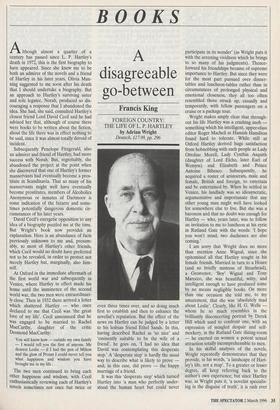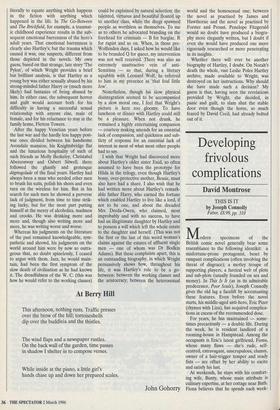BOOKS
A disagreeable go-between
Francis King
FOREIGN COUNTRY: THE LIFE OF L. P. HARTLEY by Adrian Wright Deutsch, f17.99, pp. 296 Although almost a quarter of a century has passed since L. P. Hartley's death in 1972, this is the first biography to have appeared. Since she knew me to be both an admirer of the novels and a friend of Hartley in his later years, Olivia Man- ning suggested to me soon after his death that I should undertake a biography. But an approach to Hartley's surviving sister and sole legatee, Norah, produced so dis- couraging a response that I abandoned the idea. She had, she said, consulted Hartley's closest friend Lord David Cecil and he had advised her that, although of course there were books to be written about the fiction, about the life there was in effect nothing to be said, since it was almost totally devoid of incident.
Subsequently Penelope Fitzgerald, also an admirer and friend of Hartley, had more success with Norah. But, regrettably, she abandoned the project at the point when she discovered that one of Hartley's former manservants had eventually become a pros- titute in Scandinavia. That so many of his manservants might well have eventually become prostitutes, members of Alcoholics Anonymous or inmates of Dartmoor is some indication of the bizarre and some- times potentially dangerous domestic cir- cumstances of his later years.
David Cecil's energetic opposition to any idea of a biography puzzled me at the time. But Wright's book now provides an explanation. Here is an abundance of facts previously unknown to me and, presum- ably, to most of Hartley's other friends, which Cecil would no doubt have preferred not to be revealed, in order to protect not merely Hartley but, marginally, also him- self.
At Oxford in the immediate aftermath of the first world war and subsequently in Venice, where Hartley in effect made his home until the imminence of the second world war, the two men were extraordinari- ly close. Then in 1932 there arrived a letter which shattered Hartley — who once declared to me that Cecil was 'the great love of my life'. Cecil announced that he was engaged to be married to Rachel MacCarthy, daughter of the critic Desmond MacCarthy: You will know how — outside my own family — I would tell you the first of anyone. My dearest Leslie — if I had the pen of Milton and the glow of Proust I could never tell you what happiness and wisdom you have brought me in my life . . .
The two men continued to bring each other happiness and wisdom, with Cecil enthusiastically reviewing each of Hartley's novels sometimes not once but twice or even three times over, and so doing much first to establish and then to enhance the novelist's reputation. But the effect of the news on Hartley can be judged by a letter to his lesbian friend Ethel Sands. In this, having described Rachel as 'so nice' and `eminently suitable to be the wife of a friend', he goes on, 'I had no idea that David was contemplating this desperate step.' A 'desperate step' is hardly the usual way to describe what is likely to prove and, in this case, did prove — the happy marriage of a friend.
It was this 'desperate step' which turned Hartley into 'a man who perfectly under- stood the human heart but could never participate in its wonder' (as Wright puts it with the arresting vividness which he brings to so many of his judgments). Thence- forward his friendships became of supreme importance to Hartley. But since they were for the most part pursued over dinner- tables and luncheon-tables rather than in circumstances of prolonged physical and emotional closeness, they all too often resembled those struck up, casually and temporarily, with fellow passengers on a cruise or a package tour.
Wright makes amply clear that through- out his life Hartley was a crashing snob something which his intelligent, upper-class editor Roger Machell at Hamish Hamilton found hard to tolerate. While still at Oxford Hartley derived huge satisfaction from hobnobbing with such people as Lady Ottoline Morell, Lady Cynthia Asquith (daughter of Lord Elcho, later Earl of Wemyss) and Elizabeth and Prince Antoine Bibesco. Subsequently, he acquired a roster of aristocrats, male and female, British and foreign, to entertain and be entertained by. When he settled in Venice, his landlady was so idiosyncratic, argumentative and importunate that any other young man might well have looked for somewhere else to live. But she was a baroness and that no doubt was enough for Hartley — who, years later, was to follow an invitation to me to luncheon at his eyrie in Rutland Gate with the words: 'I hope you won't mind, two duchesses are also coming.'
I am sorry that Wright does no more than mention Anne Wignal, since she epitomised all that Hartley sought in his female friends. Married in turn to a Hoare (and so briefly mistress of Stourhead), a Grosvenor, 'Boy' Wignal and Tony Marecco, she was beautiful, witty, and intelligent enough to have produced some by no means negligible books. On more than one occasion she told me, to my amazement, that she was 'absolutely mad about Leslie'. Clearly, like H. G. Wells whom he so much resembles in the brilliantly disconcerting portrait by Derek Hill which used to confront one, with an expression of mingled despair and self- mockery, in the Rutland Gate dining-room — he exerted on women a potent sexual attraction totally incomprehensible to men.
In his skilful analyses of the novels, Wright repeatedly demonstrates that they provide, in his words, 'a landscape of Hart- ley's life, not a map'. To a greater or lesser degree, all keep referring back to the author's own experience; but since Hartley was, as Wright puts it, 'a novelist specialis- ing in the disguise of truth', it is rash ever literally to equate anything which happens in the fiction with anything which happened in the life. In The Go-Between and The Brickfteld, for example, a traumat- ic childhood experience results in the sub- sequent emotional barrenness of the hero's adult years. That emotional barrenness is clearly also Hartley's; but the trauma which caused it was, one suspects, different from those depicted in the novels. My own guess, based on that strange, late story 'The Pylon', of which Wright provides a brief but brilliant analysis, is that Hartley as a young boy was either sexually abused by his strong-minded father Harry or (much more likely) had fantasies of being abused by him. In either case, the subsequent horror and guilt would account both for his difficulty in having a successful sexual relationship with anyone else, male of female, and for his reluctance to stay in the family home, Fletton Towers.
After the happy Venetian years before the last war and the hardly less happy post- war ones divided between his handsome Avondale mansion, his Knightsbridge flat and the luxurious hospitality of such of such friends as Molly Berkeley, Christabel Aberconway and Osbert Sitwell, there followed the ghastly and grotesque degringolade of the final years. Hartley had always been a man who needed other men to brush his suits, polish his shoes and even turn on the wireless for him. But in his search for such men he showed a perverse lack of judgment, from time to time strik- ing lucky, but for the most part putting himself at the mercy of alcoholics, madmen and crooks. He was drinking more and more and, though also writing more and more, he was writing worse and worse.
Whereas his judgments on the literature of the past remained knowledgeable, sym- pathetic and shrewd, his judgments on the world around him were by now so outra- geous that, no doubt spinelessly, I ceased to argue with them. Jazz, he would main- tain, had been the first symptom of the slow death of civilisation as he had known it. The dreadfulness of the W. C. (this was how he would refer to the working classes) could be explained by natural selection: the talented, virtuous and beautiful floated up to another class, while the dregs spawned people as worthless as themselves. To me as to others he advocated branding on the forehead for criminals — B for burglar, R for rapist and so on. When, in those pre- Wolfenden days, I asked how he would like to be branded Q for queer, my intervention was not well received. There was also an extremely unattractive vein of anti- Semitism — so that, during a literary squabble with Leonard Wolf, he referred to him in my presence as 'that foul little Jew'.
Nonetheless, though his slow physical disintegration seemed to be accompanied by a slow moral one, I feel that Wright's picture is here too gloomy. To have luncheon or dinner with Hartley could still be a pleasure. When not drunk, he remained a highly entertaining companion — courtesy making amends for an essential lack of compassion, and quickness and sub- tlety of response for an essential lack of interest in most of what most other people had to say.
I wish that Wright had discovered more about Hartley's older sister Enid, so often assumed to have been the prototype for Hilda in the trilogy, even though Hartley's bossy, over-protective mother, Bessie, must also have had a share. I also wish that he had written more about Hartley's remark- able father Harry, who earned the fortune which enabled Hartley to live like a lord, if not to be one, and about the dreaded Mrs Dreda-Owen, who claimed, most improbably and with no success, to have had an illegitimate daughter by Hartley and to possess a will which left the whole estate to the daughter and herself. (This was not the first or the last of this weird woman's claims against the estates of affluent single men — one of whom was Dr Bodkin Adams). But these complaints apart, this is an outstanding biography, in which Wright persuasively shows how, throughout his life, it was Hartley's role to be a go- between: between the working classes and the aristocracy; between the heterosexual world and the homosexual one; between the novel as practised by James and Hawthorne and the novel as practised by Forster and Proust. Penelope Fitzgerald would no doubt have produced a biogra- phy more elegantly written, but I doubt if even she would have produced one more rigorously researched or more penetrating in its insights.
Whether there will ever be another biography of Hartley, I doubt. On Norah's death the whole, vast Leslie Poles Hartley archive, made available to Wright, was destroyed on her instructions. Why should she have made such a decision? My guess is that, having seen the revelations provided by Wright, she decided, in panic and guilt, to slam shut the stable door even though the horse, so much feared by David Cecil, had already bolted out of it.



































































 Previous page
Previous page